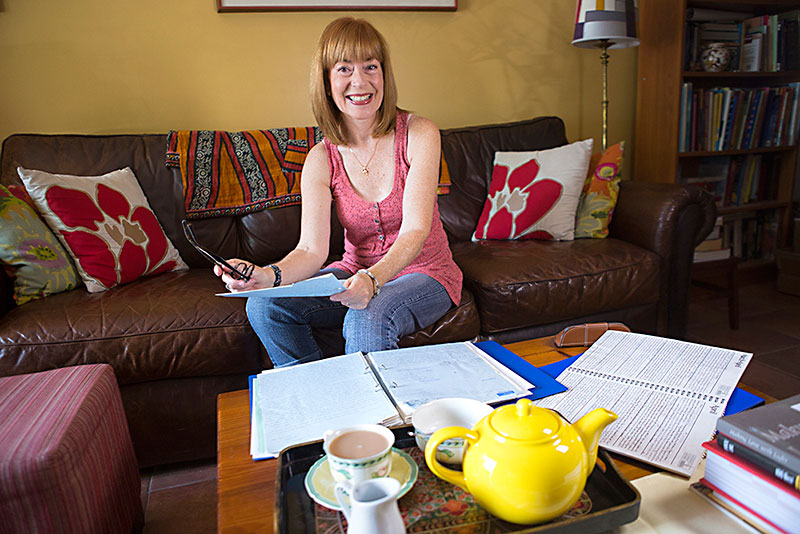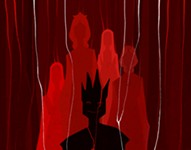A New Cuppa Tea in Tripoli
Actress Bernadette Nason takes tales of a year in Libya and brews a potent memoir
By Robert Faires, Fri., Aug. 18, 2017
Bernadette Nason knew her mid-Eighties year of living as an English expat in Libya held a rich vein of crowd-pleasing yarns. The award-winning actress had been mining it for years in backstage dressing rooms, regaling fellow thespians with accounts of furtive attempts at making homemade hooch in the Muslim nation and scary run-ins with Moammar Gadhafi's morality police, and the tales proved so popular that her theatre pals began to request repeat tellings of their favorites. That eventually led Nason to stitch several of her stories into a one-woman show, Tea in Tripoli, for City Theatre's Summer Acts! Austin 2011 festival, where her tales were received as enthusiastically by strangers as they had been by friends. What Nason didn't know until that point, though, was that the rich vein of stories might also hold a book.
This week's debut of Tea in Tripoli: A Memoir (Brave Bear & Company, $17.95, available on Amazon) proves that it did, but the idea of taking her tales from stage to page wouldn't have occurred to Nason without some prodding from her audience. "I hadn't intended to write the book until after the stage presentation when people wrote to me – actually, in quite large numbers – to say, 'I hope you're going to write a book, because you have so many stories there. There must be others.'"
There were other stories – many, in fact – but they weren't all as amusing or palatable as the ones in the show. Some involved painful, even traumatic, incidents that Nason deliberately glossed over or outright omitted from the performance because she had never shared them widely. They'd been bottled up inside her for 30-odd years, and she wasn't sure she wanted to let them out. A failed marriage at age 22, rape, and sexual harassment by her boss all played a part in Nason's decision to bolt from England for North Africa when she was 26, parts of the story that she hadn't disclosed onstage. Would she be willing to do so in print?
"I had long discussions with my therapist about whether I wanted the public to know any of this," says Nason. "Did I want to just entertain people, or did I want to divulge things? I was tempted to make the book as light as the performance pieces. But I was afraid that if I left out [my true motivations for going to Libya], people would say, 'Why did she do that? That doesn't seem like a good enough reason to run away.'"
Ultimately, Nason found the courage to open her secret self and set down the full story, in all its painful details. As a result, the memoir has a grounded quality and a dimension sometimes missing from the stage version of Tea in Tripoli. Nason's toxic experiences at home make it much clearer why she would make such a dramatic break for a job in a country so far away and different from her own. And while Nason still plays up her naivete for humorous effect – it wouldn't really be a story by "Berni," as she's known to intimates, without a healthy helping of wry asides and self-deprecating quips – she treats the conditions in Libya and life under Gadhafi with a gravity that's absorbing. This is a place where wild dogs run in packs through the village where Nason lives; where a few innocent clicks of an Instamatic on the roof of a building inspires panic in one of Nason's co-workers, who fears she may be accused of spying; where a checkpoint stop on a trip into the desert with some Aussies finds Nason staring down the barrel of an AK-47 held by a very nervous, shaking 15-year-old. The book vividly creates an atmosphere of danger.
"The most terrifying moment," Nason recalls, "was when I moved into a new apartment – and I was very lucky to get the apartment – and a lot of men came to my flat to do work on it: pest control, hang my dartboard, and so on. A lot of men came to my apartment, and, as I say in the book, no one ever said the word 'prostitute,' but I was given a notice, in Arabic, to take to my boss. A policeman came to my door and said, 'Take this to your office,' which I did, and it was clear that I was going to have to answer a charge. That was the point at which I thought, 'You're not really safe here.'"
Nason always managed to get out of such scrapes unharmed (in the last, she did have to appear before the police and spent a harrowing 90 minutes being interrogated but was finally released without being charged). Still, 15 months in, she sensed the danger increasing and with it the likelihood that she would eventually be hurt. The reader's appreciation of her decision to return to England is heightened because Nason has provided so much detail about the world she was living in – detail made possible by a journal Nason kept at the time and letters written home that her mother kept. With so many of their activities curtailed by the political situation – the British Embassy was closed and all diplomatic ties to Libya severed in 1984 following the fatal shooting of British police officer Yvonne Fletcher outside the Libyan Embassy in London – the expats had time on their hands and they spent a lot of it writing. Nason has been able to give us the Libya she experienced through the way she recorded it then.
In reviewing and reliving this moment of her life, Nason has come to see a certain kind of universality in it and believes she was right to be more open in the memoir, however difficult it was – and is. She says, "The two reactions I've had thus far from women are: 'There but for the grace of God go I,' and 'That happened to me, and I'm glad you're talking about it.' Even now, there's a part of me that's reluctant to share, and yet here I am doing it. It's like saying to you, 'I suffer from terrible stage fright; so why the hell do I get onstage and act? I don't know. I just do it.' It's all part of this desire ... the common element – what do we all have in common? We all want to belong, we want to feel part of something, and I know there are people who have had the same experience as me."
Writing Tea in Tripoli has also given Nason a new perspective on her younger self. "Oh, I am so much more forgiving now than I used to be," she says. "In the process of writing this, I have realized how naive I was and how blameless on almost every count. Even the one occasion when I was bitchy – in the book, I do talk about an occasion when someone was bitchy to me and I didn't deserve it – but there was an occasion when I fell into that abyss myself and had the opportunity later to go up and say 'sorry' to her, and I never did, because I didn't know how easy it was to say, 'I'm sorry. I messed up there. I shouldn't have said what I did. I was wrong.' But I look back on that now and I think, no one in your family taught you that. You have a wonderful family, but if something goes wrong, people tend not to use the words 'I'm sorry,' and I've had to learn how to do that. So I look back on those days and think, 'I did the best I could.' It was an adventure, but a young, innocent, and extremely naive person's adventure. I'd never encountered the like, I had never been in a situation where I literally had to fend for myself. And I think in some ways I did very well. In others, I did really badly. But I didn't give up, so I learned from it. I almost apologize to myself for having put myself in that situation and expecting myself to do well. But I wouldn't change a thing. And mostly I think, 'Good for you for trying.'"
Bernadette Nason performs “Tales From Tea in Tripoli” at the book launch for Tea in Tripoli Sun., Aug. 20, 6pm, at Austin Playhouse at ACC Highland campus, 6001 Airport. For more information, visit www.bernadettenason.com.













